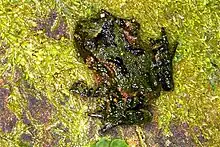| Archaeobatrachia Temporal range: Early Jurassic to present, | |
|---|---|
 | |
| Hochstetter's frog (Leiopelma hochstetteri) | |
| Scientific classification | |
| Domain: | Eukaryota |
| Kingdom: | Animalia |
| Phylum: | Chordata |
| Class: | Amphibia |
| Order: | Anura |
| Suborder: | Archaeobatrachia |
| Families | |
|
Ascaphidae | |
Archaeobatrachia (Neo-Latin archaeo- ("old") + batrachia ("frog")) is a suborder of the order Anura containing various primitive frogs and toads. As the name suggests, these are the most primitive frogs. Many of the species (28 in total) show certain physiological characteristics which are not present in other frogs and toads, thus giving rise to this group. They are largely found in Eurasia, New Zealand, the Philippines, and Borneo, and are characteristically small. In addition, the family Ascaphidae is found in the Pacific Northwest and northern Rocky Mountains of the United States, and is only represented by two species. The taxon is considered paraphyletic.
References
- Gissi, Carmela; San Mauro, Diego; Graziano, Pesole; Zardoya, Rafael (February 2006). "Mitochondrial phylogeny of Anura (Amphibia): A case study of congruent phylogenetic reconstruction using amino acid and nucleotide characters". Gene. 366 (2): 228–237. doi:10.1016/j.gene.2005.07.034. PMID 16307849.
- Roelants, Kim; Bossuyt, Franky (February 2005). "Archaeobatrachian paraphyly and pangaean diversification of crown-group frogs". Systematic Biology. 54 (1): 111–126. doi:10.1080/10635150590905894. PMID 15805014.
- San Mauro, Diego; Garcia-Paris, Mario; Zardoya, Rafael (December 2004). "Phylogenetic relationships of discoglossid frogs (Amphibia:Anura:Discoglossidae) based on complete mitochondrial genomes and nuclear genes". Gene. 343 (2): 357–366. doi:10.1016/j.gene.2004.10.001. PMID 15588590.
- San Mauro, Diego; Vences, Miguel; Alcobendas, Marina; Zardoya, Rafael; Meyer, Axel (May 2005). "Initial diversification of living amphibians predated the breakup of Pangaea" (PDF). American Naturalist. 165 (5): 590–599. doi:10.1086/429523. PMID 15795855. S2CID 17021360. Retrieved 2006-03-27.